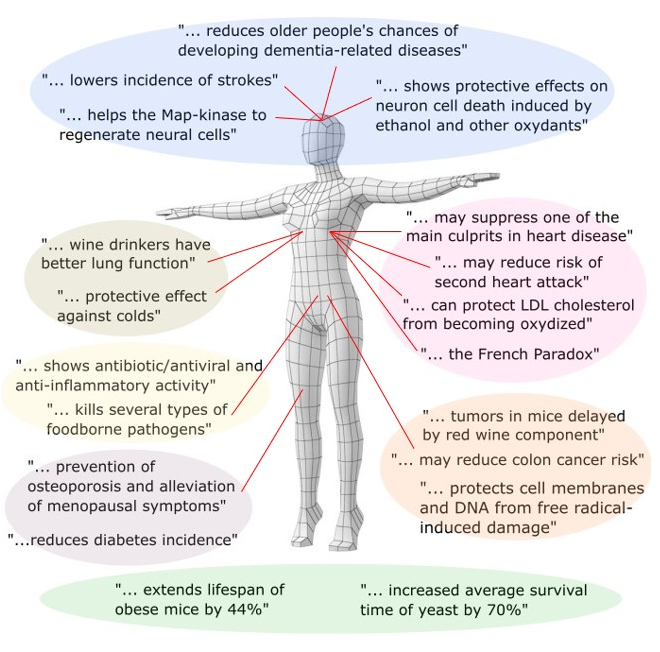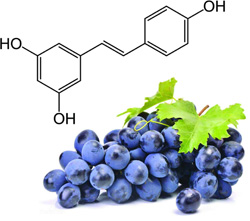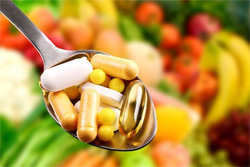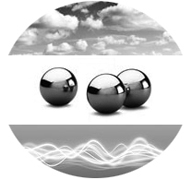Gateway to the Best Science News Sources
Our editors' picks for the top 3 news sources in each category:
|
|
Health Benefits of Red Wine: A Scientific Roundup
Since disclaimers have become the mandatory preface to any statement regarding human health, let's get this one out of the way: If you drink too much wine, you'll get sick; if you drink too much wine too often, you'll get really sick.
Though widely touted until the end of the 20th century, some of the near-magical health effects of red wine have been challenged by some in-depth research studies in the past two decades. During the same time, however, new benefits have been uncovered by equally serious studies. We will attempt here to sort out the health benefits associated with a moderate consumption of red wine, as reported in the peer-reviewed scientific literature. The Wine Alchemist CauldronWine is one of the few man-made products to stand at a convergence point of the mineral, vegetal, microbial, and chemical worlds, as illustrated in the graphic below. Independently, each of these elements have been shown to produce molecules beneficial to human health. Plants and microorganisms, notably, have been key sources of therapeutic compounds, ranging from anti-inflammatory drugs (e.g.; aspirin) to analgesics (e.g.; opiates) and antibiotics (e.g.; penicillin).  The vine will pull in compounds from the soil itself, as well as chemicals produced by microorganisms that live in the soil. These compounds will participate in the plant's physiology and will end up in grapes, either native or after modification by plant enzymes. During the ripening of the grape, another agent will contribute to the formation of unique molecules: the sun. Chemical processes triggered by sunrays will result in the synthesis or modification of compounds such as pigments, which have widely documented therapeutic properties.
Red Wine Chemicals
Basic chemicals found in wine include a wide variety of sugars, alcohols, acids, esters, aldehydes, and inorganic salts. These contribute little to the health properties of wine, when they don't outright contribute to its downside. Sugars such as glucose or fructose, which are small molecules readily absorbed into the bloodstream, may cause a spike in your blood sugar. The detrimental effects of alcohols have been broadly discussed, and as for aldehydes, such as acetaldehyde, they remain high on the list of potential culprits behind these awful hangovers. Vitamins are present in wine, mainly from the B family, but they are present in such low amounts that they are unlikely to deliver significant benefits. Polyphenols, a broad family of natural pigments found in many plants, have been the main focus of studies addressing the health benefits of red wine. Their antioxidant properties are still touted all over the media as a magic bullet against many ills and are at the core of many commercials for fruits and health supplements. The main types of polyphenols are flavonoids, phenolic acids, stilbenes, and tannins. Snapshot of the Health Benefits of Red WineThe graphic below illustrates some of the health benefits associated with a moderate consumption of red wine, as reported in the peer-reviewed scientific literature. It does not constitute an exhaustive review of these benefits, even though the array of physiological functions addressed is quite impressive.  A Friend in Small Doses: AlcoholLike many chemicals with bioactive properties, alcohol (ethanol) can be a friend at low doses and a destructive foe at higher doses. The concept of "moderate" alcohol consumption remains a source of debate in the scientific community. Current CDC guidelines define it as the consumption of 1-2 drinks/day for men and 1 drink/day for women, where one drink is defined as 5 ounces of wine, 12 ounces of regular beer, or 1.5 ounces of 80-proof liquor. A regular but moderate intake of alcohol has been associated with positive health outcomes such as reduced rates of cardiovascular disease and strokes, an increase in good (HDL) cholesterol, and a possible reduction in the incidence of type 2 diabetes. It is also difficult to deny the contribution of alcohol to social interactions and gatherings, as well as the stress-reducing effects of a glass of wine at the end of a long day at the office. The Antioxydant Tribe and Its Fallen King: ResveratrolThe majority of the benefits linked to red wine, which range from cardiological to neurological, and from metabolic to gastroprotective have been credited to the action on the human body of polyphenols (and to a lesser extent, of alcohol itself)[1]. Polyphenols are powerful antioxidant and anti-inflammatory molecules present in red wine at levels 10-fold higher than in white wine. Most of these compounds are also present in large amounts in berry and citrus fruits, teas, nuts, and various vegetables. The polyphenol content of green teas largely exceeds that of red wine, but the polyphenol fingerprint of each of these products is unique and a specific combination of compounds might deliver a higher punch at lower doses. 
The most widely studied polyphenol in wine has been resveratrol. Once touted as the component that could account for all of red wine's health benefits, it has since been brought back down from its pedestal. Research studies on the impact of resveratrol on human health[2] have concluded on protective and/or beneficial effects on:
These findings were not surprising in light of the strong antioxidant and anti-inflammatory properties of resveratrol, but the dosage required for this chemical to deliver such benefits was much higher than the one that could ever be reached as a result of a moderate consumption of red wine. One would have had to gulp over 600 bottles of red wine a day to reach an active physiological concentration of resveratrol, which might have come with a slight headache... Because of this realization, resveratrol was recently back-burnered and moved from the scientist's bench to the supermarket shelf, where it joined the legions of questionable "health supplements." Synergy: Life's Delicate Balance
Resveratrol is not the only polyphenol in wine to have been associated, in research studies and at high dosages, with health benefits spanning the whole body. Similar claims have been made for other wine compounds, namely flavonoids such as quercetin and anthocyanins, phenolic acids such as ellagic acid, or condensed tannins such proanthocyanins. Like resveratrol, each of these compounds is also marketed as a health supplement, despite the lack of scientific evidence that it might deliver, outside the laboratory and on its own, the claimed benefits. Any of the polyphenols naturally present in wine, on its own, will have to overcome two major challenges to deliver the health benefits it exhibited in-vitro, in laboratory studies:
Epidemiological studies in which a correlation was established between red wine consumption and improved health outcomes, such as lower rates of cardiovascular disease or diabetes, have provided solid evidence of the positive contribution of red wine to human health. However, no wine component, or group of wine components, could been singled out as responsible for these benefits. 
The most likely reason behind that discrepancy is that the powerful antioxidants and anti-inflammatory polyphenols present in wine act in synergy not only with one another—possibly enabling them to be active at lower dosages—but also with the alcohol component of wine, and with behavioral and lifestyle parameters. Individuals who choose wine as their favorite drink over beer or spirits and exercise restraint in their consumption tend to have healthier lifestyles[3]. Their diet involves fewer red meats and more fruits and vegetables; they exercise more regularly and are less likely to smoke. So... To Wine or Not to Wine?The body of scientific evidence linking a moderate consumption of red wine with improved health outcomes for many organs and functions of the human body is compelling. Research studies could not single out any individual component of wine as the magic bullet that could have explained these benefits, so drinking a glass of red wine before dinner will beat any polyphenol health supplement on the shelf of your local drugstore. 
It is most likely the combination of the high polyphenol content of red wine, the auxiliary benefits of alcohol in moderation, and a healthy lifestyle that account for the wine's health perks. Therefore, we will close this article with the following prescription for success: A brisk walk in the morning, a Mediterranean-style lunch, and a healing glass of Merlot before dinner! References[2] Weiskirchen, S. and Weiskirchen R., Adv Nutr. 2016 Jul; 7(4): 706-718. Publication date: June 22, 2021 |
|
|
|
|
Copyright© 1997-2021 Guy Orgambide |

